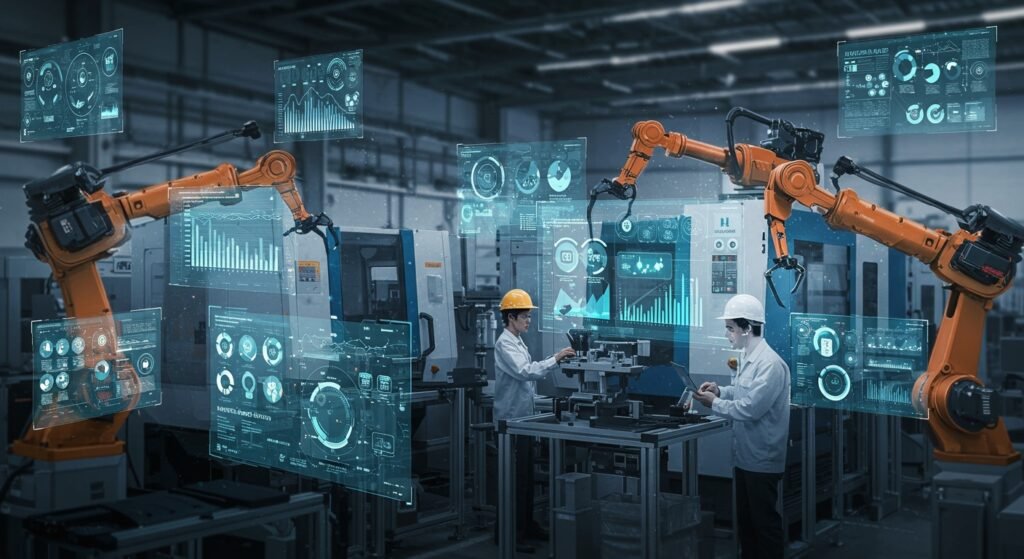In the rapidly evolving landscape of global manufacturing, the integration of technology and operational excellence is paramount. This is where Industrial Engineering in Smart Manufacturing emerges as a critical discipline, bridging the gap between cutting-edge digital innovations and efficient production processes. Smart manufacturing, characterized by cyber-physical systems, IoT, cloud computing, and AI, promises unprecedented levels of productivity and customization. Industrial engineers are uniquely positioned to design, optimize, and manage these complex, interconnected systems, ensuring that the promise of Industry 4.0 translates into tangible benefits.
Table of Contents
- Introduction to Industrial Engineering in Smart Manufacturing
- The Pivotal Role of Industrial Engineers in Smart Factories
- Key Principles and Technologies Driving Smart Manufacturing
- Benefits of Integrating Industrial Engineering and Smart Manufacturing
- Challenges and Solutions in Adoption
- Future Trends and Outlook
- Conclusion
Introduction to Industrial Engineering in Smart Manufacturing
Smart manufacturing represents a paradigm shift from traditional production methods, leveraging advanced technologies to create highly flexible, adaptive, and interconnected factories. At its core, it aims to enhance efficiency, reduce costs, and enable rapid response to market demands. Industrial engineering provides the methodological framework to achieve these goals within the smart factory environment. It applies scientific principles to improve processes, eliminate waste, and optimize resource utilization, making it an indispensable component of successful smart manufacturing implementation.
The Pivotal Role of Industrial Engineers in Smart Factories
Industrial engineers are the architects of efficiency. Their expertise in process optimization, supply chain management, human factors, and data analysis is crucial for designing and operating smart manufacturing systems. They work to:
- System Design and Integration: Ensure seamless integration of diverse technologies like IoT sensors, AI algorithms, robotics, and cloud platforms.
- Data-Driven Decision Making: Utilize big data analytics to identify bottlenecks, predict maintenance needs, and optimize production schedules.
- Human-Machine Collaboration: Design work environments where humans and robots can collaborate effectively and safely, enhancing productivity.
- Supply Chain Optimization: Apply advanced analytics and digital twins to create resilient and efficient supply chains.
- Lean and Agile Methodologies: Adapt traditional lean principles to the dynamic nature of smart factories, fostering continuous improvement.
Key Principles and Technologies Driving Smart Manufacturing
The success of Industrial Engineering in Smart Manufacturing hinges on the strategic application of several key technologies and principles:
- Internet of Things (IoT): Connecting machines, sensors, and devices to gather real-time data.
- Artificial Intelligence (AI) & Machine Learning (ML): For predictive maintenance, quality control, and process optimization.
- Robotics and Automation: Enhancing precision, speed, and safety in manufacturing operations.
- Cloud Computing: Providing scalable infrastructure for data storage and processing.
- Digital Twins: Virtual replicas of physical systems for simulation and optimization.
- Cyber-Physical Systems (CPS): Integration of computation, networking, and physical processes.
For more insights into cutting-edge production methods, explore our article on Advanced Manufacturing Techniques.
Benefits of Integrating Industrial Engineering and Smart Manufacturing
The synergy between industrial engineering principles and smart manufacturing technologies yields significant advantages for businesses:
| Benefit Area | Impact of IE & SM Integration |
|---|---|
| Increased Efficiency | Optimized workflows, reduced cycle times, higher throughput. |
| Cost Reduction | Minimized waste, predictive maintenance saving repair costs, optimized energy use. |
| Improved Quality | Real-time defect detection, enhanced precision, consistent product output. |
| Enhanced Flexibility | Rapid adaptation to market changes, customized production runs. |
| Better Decision-Making | Data-driven insights, real-time analytics for operational adjustments. |
| Greater Sustainability | Reduced resource consumption, optimized energy use, lower carbon footprint. |
Challenges and Solutions in Adoption
Implementing smart manufacturing initiatives, even with the guidance of industrial engineers, comes with its own set of challenges. These include high initial investment costs, cybersecurity risks, the need for a skilled workforce, and data interoperability issues. Solutions involve phased implementation, robust cybersecurity protocols, continuous training programs for employees, and the adoption of open standards for data exchange.
Future Trends and Outlook
The future of Industrial Engineering in Smart Manufacturing is bright and dynamic. Emerging trends include the increasing adoption of AI and machine learning for predictive analytics and autonomous operations, the rise of edge computing for faster data processing, and advancements in human-robot collaboration (cobots). Furthermore, the concept of a circular economy within smart manufacturing is gaining traction, focusing on sustainability and resource efficiency. The role of industrial engineers will continue to evolve, requiring them to be proficient in data science, advanced analytics, and interdisciplinary collaboration.
For more detailed information on global industrial trends, you can visit resources like The World Economic Forum.
Conclusion
Industrial Engineering in Smart Manufacturing is not just a concept; it’s the operational backbone of the next industrial revolution. By systematically applying engineering principles to the complexities of digital factories, industrial engineers ensure that smart manufacturing initiatives deliver on their promise of unparalleled efficiency, adaptability, and sustainability. As industries continue to embrace digitalization, the demand for professionals who can effectively bridge the gap between technology and operational excellence will only grow, solidifying the indispensable role of industrial engineering in shaping the future of global production.


